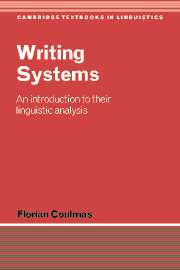Book contents
- Frontmatter
- Contents
- List of illustrations
- List of tables
- Acknowledgements
- A note on fonts
- List of abbreviations and conventions
- 1 What is writing?
- 2 The basic options: meaning and sound
- 3 Signs of words
- 4 Signs of syllables
- 5 Signs of segments
- 6 Consonants and vowels
- 7 Vowel incorporation
- 8 Analysis and interpretation
- 9 Mixed systems
- 10 History of writing
- 11 Psycholinguistics of writing
- 12 Sociolinguistics of writing
- Appendix: Universal Declaration of Human Rights, article 1
- Bibliography
- Index of names
- Index of subjects
7 - Vowel incorporation
Published online by Cambridge University Press: 05 June 2012
- Frontmatter
- Contents
- List of illustrations
- List of tables
- Acknowledgements
- A note on fonts
- List of abbreviations and conventions
- 1 What is writing?
- 2 The basic options: meaning and sound
- 3 Signs of words
- 4 Signs of syllables
- 5 Signs of segments
- 6 Consonants and vowels
- 7 Vowel incorporation
- 8 Analysis and interpretation
- 9 Mixed systems
- 10 History of writing
- 11 Psycholinguistics of writing
- 12 Sociolinguistics of writing
- Appendix: Universal Declaration of Human Rights, article 1
- Bibliography
- Index of names
- Index of subjects
Summary
It is clear that the Kharoṣṭī and Brāhmī scripts as we know them were elaborated by ancient pandits who had a high degree of sophistication in phonetics.
William BrightMost writing systems are interpreted as referring in some way to the phonetic composition of speech forms. In the process the natural continuous flow of sound is artificially broken up into discrete units of various size. The syllable is an intuitively salient unit exploited to this end by several ancient and modern writing systems such as Assyrian cuneiform, Cypriot and Japanese kana, as we saw in chapter 4. It also plays a critical role in the Indian writing systems, which are the subject of this chapter. Syllables are typically composed of consonants and vowels, which, in the Western tradition, as a reflection of the Greek alphabet are both uniformly considered sound segments, while in Semitic writing consonants and vowels are conceptualized and symbolized differently. The use of matres lectionis in archaic Semitic documents, discussed in chapter 6, is clear evidence that the Semitic scribes had a notion of a vowel as a unit of language. For reasons having to do with the conservative nature of writing systems in general and with the semantic significance of consonants in Semitic languages, they chose not to, or were not able to, treat both classes of sounds in the same manner.
- Type
- Chapter
- Information
- Writing SystemsAn Introduction to Their Linguistic Analysis, pp. 131 - 150Publisher: Cambridge University PressPrint publication year: 2002



